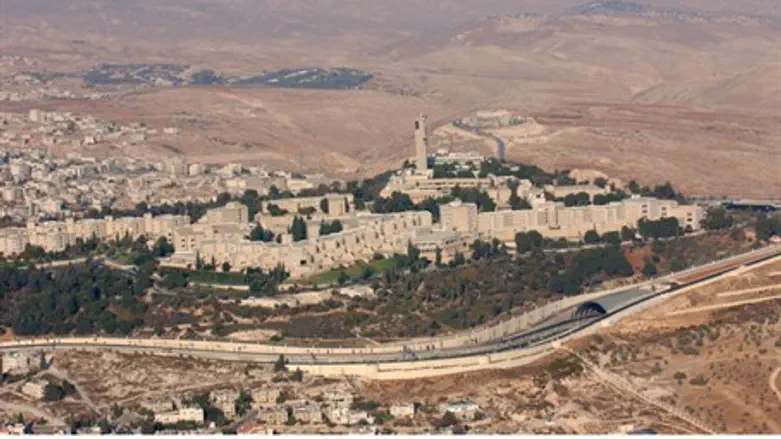
The Knesset's Committee for Public Petitions held a discussion Tuesday following complaints by students at Hebrew University's Mount Scopus (Har Hatzofim) campus, regarding ongoing harassment by Arab hoodlums and insecurity on and around the campus.
The worrisome situation was recently highlighted by a two-man Channel 2 News team that succeeded in smuggling a knife into the campus, although the reporters were not carrying student IDs.
The students at the campus have suffered harassment at the hands of residents of the neighboring hostile Arab village of Issawiya for a very long time. Arutz Sheva has reported time and again over the years that female students are routinely accosted and assaulted, and that students of both sexes – and even soldiers in a nearby base – feel that they live in a war zone.
With the recent spike in violence in Jerusalem, the students increasingly live in a state of fear.
“Students who contacted me feel that their lives are in danger," committee chairwoman MK Adi Kol (Yesh Atid) told the committee. “The security situation at Mount Scopus is not great, to put things mildly, and the students expect the security arrangements to adapt to the changing situation, and that the checks at the entrance to the campus be stricter.”
"The students claim that they turned to the university management but did not receive a proper response,” she added. “After watching the investigative report, how can we calm down the students? I feel that the students have not received clear answers and that is why I have convened the discussion.”
Student Union representatives pointed to a variety of problematic areas, from the insufficient security checks at the entrances to the campus, to the lack of safety in walking outside of the campus, and the roads to the campus from city center.
Long lines are a worse threat?
Shmulik Dahan, who heads the university's security force, said that between 5,000 and 15,000 students enter the university in the space of 30 minutes every morning, and that if security officers opened every bag that is brought into the campus, long lines will form outside the gates. These lines themselves could become targets for terror, he explained.
Dahan said that the university invests tens of millions of shekels from its budget in security and that a variety of means are employed to identify suspects, even before they reach the gates. He added that while there are complaints about a lack of security measures, he also receives complaints about “hysteria” and lines that force students to wait in the rain at the gates.
Security incidents in October and November are down by 50-70 percent compared to 2013, he contended, but he agreed that overall, the security situation in French Hill and Mount Scopus is not good.
Major Yuval Reuven of the Israel Police seconded Dahan in saying that long lines at the gates would themselves become a target for terror. “This is a much more tangible and lethal threat than someone entering with a knife,” he contended. He said that security consists of “several circles,” some of which are undercover and some technological.
Ever since the abduction and murder of the three yeshiva students earlier in the year, security in the area has been continuously beefed up, he added, with hundreds of additional policemen on the job. He expressed hope that over time, the sense of security will return to the residents and students.
Nine students and staff members of the university were murdered in a bomb attack on the Mount Scopus campus in 2002. Five of the dead were US citizens.